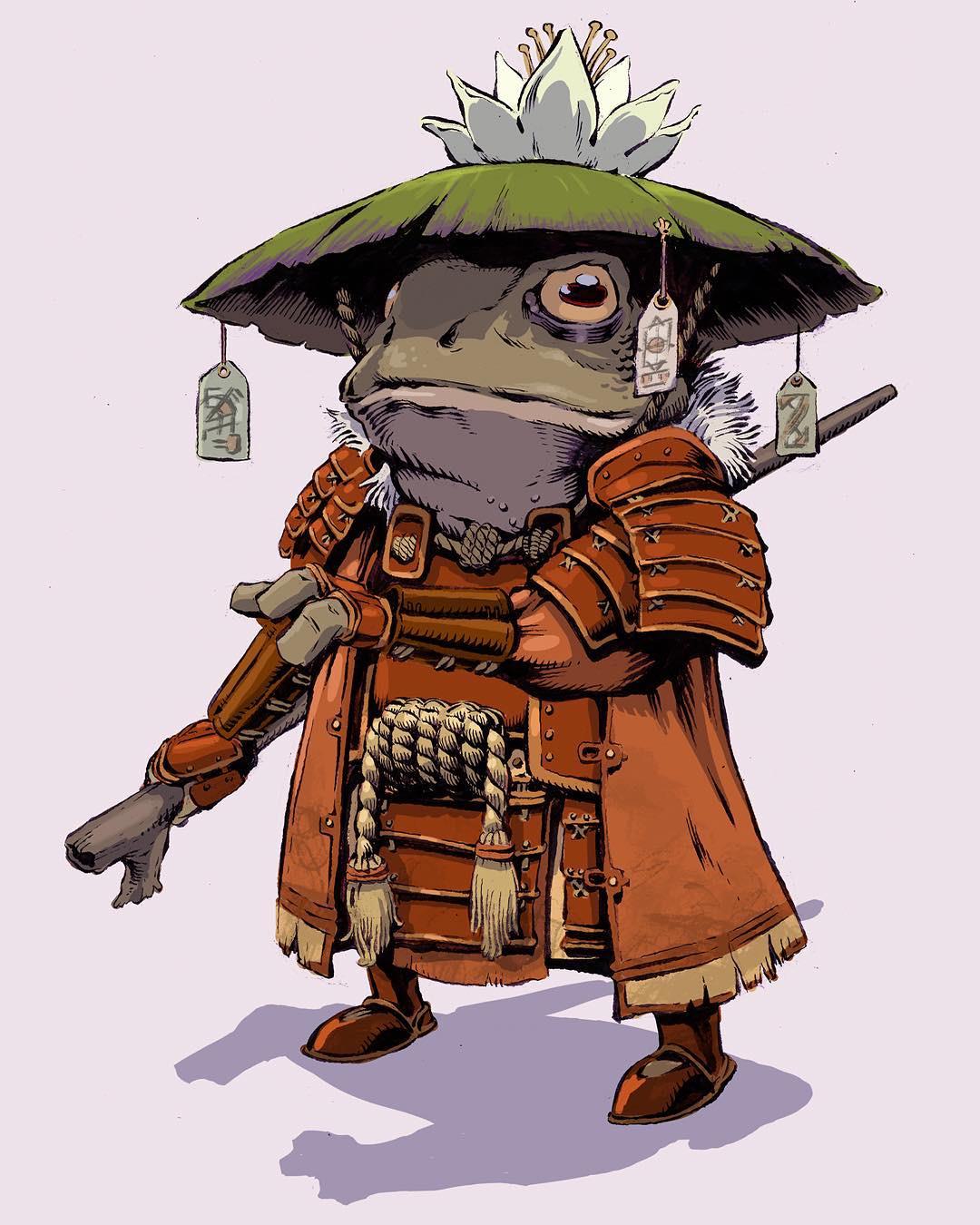Frogfolk
Found in most forest, swamps, and cities, Frogfolk do not have a native land to call home. They usually try to sequester themselves into their own little tribes to keep from disturbing, or being disturbed by others.
Art by Lord-of-the-slugs
Frogfolk Traits
All Frogfolk share the following attributes:
Ability Score Increase. Your Wisdom score increases by 1.
Age. Frogfolk tend to mature faster than other races, becoming adults at around 10 years old, and most dying before they reach the age of 60.
Alignment. Frogfolk are a caring and conscientious race, most being of good alignment. How they go about doing their good deeds depends on their upbringing but most follow some form of code.
Darkvision. Frogfolk have large eyes with horizontal elliptical pupils that are designed for hunting in low light conditions. You can see in dim light within 30 feet of you as if it were bright light, and in darkness as if it were dim light. You can't discern color in darkness, only shades of gray.
Standing Leap. Your long jump is up to 20 feet and your high jump is up to 10 feet, with or without a running start.
Partially Amphibious. By absorbing oxygen through your skin, you can breathe underwater for up to 1 hour. Once you've reached that limit, you can't use this trait again until you finish a long rest.
Languages. You can speak, read, and write Common, one extra language of your choosing.
Subraces. The three main kinds of Frogfolk; King Frogs, Spider Frogs, and Painted Frogs. They differ due to evolving in different environmental conditions. Choose one of these subraces.
King Frogs
King Frogs get their name sake from the small spikes and bumps on their head. The other subraces joke that they look like a crown. King Frogs are biggest of all the subraces, and the least Frog like. They are frequently likened to Orcs, though they in fact have quite a calm and passive nature. That is until you provoke one. King Frogs have tough leathery skin, and have colorings ranging from dark greens to browns. Occasionally there might be a Golden King Frog, but that only occurs once every few thousand years.
Ability Score Increase. Your Strength increases by 2.
Size. Your size is Medium.
Speed. Your base walking speed is 30 feet. You also have a climb speed of 30 feet.
Powerful Build. You count as one size larger when determining your carrying capacity and the weight you can push, drag, or lift.
Aggressive Leap. As a bonus action, you can move up to your movement speed toward a hostile creature you can see or hear. You must end this move closer to the enemy than you started.
Ambush. Despite your size, King Frogs often attempt to ambush their prey, before finishing them off with their Aggressive Leap when they try to run. If you surprise a creature and hit it with an attack on your first turn in combat, the attack deals an extra 2d6 damage to it. You can use this trait only once per combat.



Spider Frogs
So called because they attempt to mimic spiders with their movements and traits, Spider Frogs are know for their stealth and maneuverability. Most often found in forests or cities, Spider Frogs are less well known than their counterparts due to their fairly plain look and small size. Spider Frogs have large eyes on the side of their heads and whose pupils take up most them. They are most often found to be one of the various shades of green, though not as darkly colored as a King Frog. They can be easily mistaken for deformed Lizardfolk.
Ability Score Increase. Your Dexterity increases by 2.
Size. Your size is small.
Speed. Your base walking speed is 25 feet.
Frog Climb. You also have an enhanced climb ability. You can move up, down, and across vertical surfaces and upside down along ceilings, while leaving your hands free. You have a climbing speed equal to your walking speed.
Darkvision. Spider Frogs are most active at night and have better vision than their counterparts due to having much larger eyes. You can see in dim light within 60 feet of you as if it were bright light, and in darkness as if it were dim light. You can't discern color in darkness, only shades of gray.
Weathervane. You are very in touch with the atmosphere and climate. You can sense changes in the weather and get an urge to croak whenever the weather does change.
Darting Tongue. Your tongue is a natural weapon, which you can use to make unarmed strikes. If you hit with them, you deal slashing damage equal to 1d4 + your Dexterity modifier, instead of the bludgeoning damage normal for an unarmed strike.
Once per short rest you can use your Darting Tongue as a reaction to a creature moving or dashing within 30 feet of you. If you hit, instead of dealing damage you force the creature to make a Strength saving throw of be pulled 5 feet toward you. The DC of the save equals 8 + your proficiency bonus + your Constitution modifier. Once you use this trait, you can't use it again until you finish a short or long rest.
Painted Frogs
Painted Frogs tend to live in humid, rainy areas and prefer forests or small villages to cities. This is due to the beautiful colored patterns that cover their bodies which draw so much attention, and for which this subrace is named. Most Painted Frogs are thought of as being poisonous due to their colorings but in fact they have evolved away from that, though they still retain some remnant of familiarity with poison. Painted Frogs always look slick or wet, and have the most beautiful colors on their skin. Most have black striped patterns covering them as well, but not all. Some are pure rainbows.
Ability Score Increase. Your Charisma increases by 2.
Size. Your size is Medium.
Speed. Your base walking speed is 30 feet. You also have a climb speed of 30 feet.
Poison in your Blood. You have resistance to poison damage.
Hypnotic Skin. While you are not wearing armor you can use a bonus action to make your skin's pattern ripple in a hypnotic display for the next minute. Any creature who can see you and targets you with an attack or a harmful spell must first make a Wisdom saving throw. On a failed save, the creature must choose a new target or lose the attack or spell. The DC of the save equals 8 + your proficiency bonus + your Charisma modifier. This does not protect you from area effects, such as the explosion of a fireball.
If you make an attack, cast a spell that affects an enemy, or deal damage to another creature, this effect ends. Once you use this trait, you can't use it again until you finish a short or long rest.
Art by Conor Nolan

